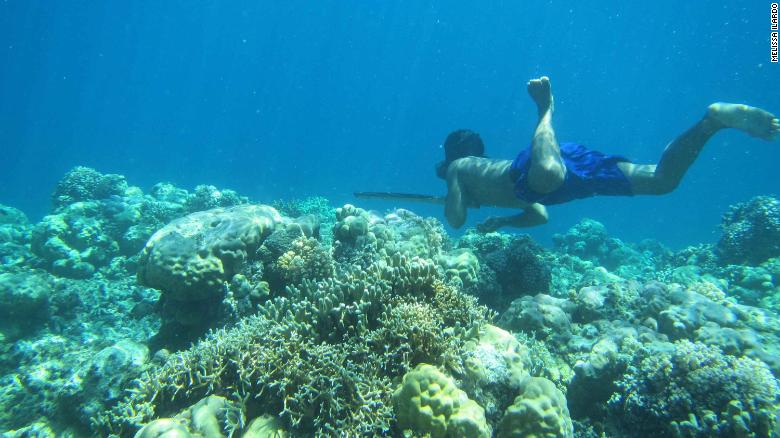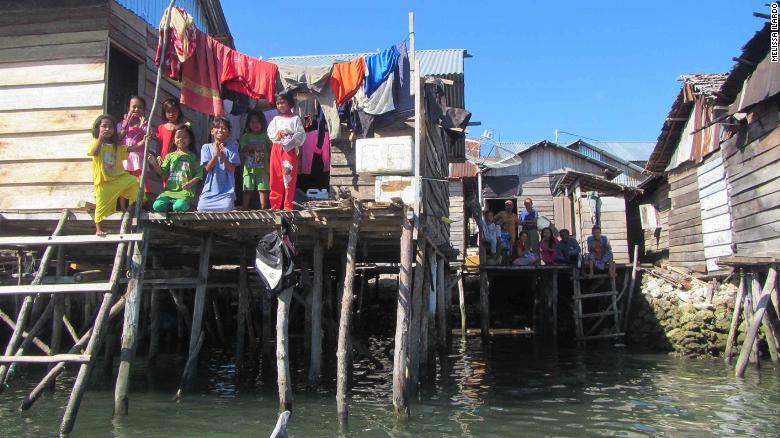Evolutionary Survival Advantages: Man as Marine Animal
"The Bajau have this subsistence that depends on marine foods, and they've been known to have this lifestyle for more than a thousand years. They're pretty incredible: They can dive for very long periods of time for more than 70 metres, with nothing but a set of rustic wooden goggles and a set of weights, nothing like the equipment we would use today."
"The Saluan diverged from them about 15,000 years ago, and they are not known to have this marine lifestyle. So the idea was to contrast these two populations with similar ancestries, but different lifestyles. We wanted to see if there was some difference in their genomes that could explain this."
"This gene existed before the Bajau, because the Saluan have it too. But once they diverged from each other, at some point in history, it became advantageous for Bajau individuals to have this after the Bajau adapted to this particular lifestyle."
"Individuals who had it tended to survive more than others, or maybe they had more children. The fact that both Bajau divers and non-divers have the large spleen points to the fact that this is something they have from birth rather than something they acquired through experience over time."
"We're [humankind] still evolving. Evolution hasn't stopped at any point in time."
Fernando Racimo, assistant professor, University of Copenhagen, Denmark
 |
| A Bajau diver uses a spear to hunt fish. CNN |
"The lung chest wall could become more compliant [the environmental adaptation displayed by the Bajau. There] could be some looseness that develops over your training [throughout a lifetime]. The diaphragm could become stretched."
"The abs could become more compliant. We don't really know if those things occur."
"The spleen is able to contract to some extent but we don't know of any direct connection between thyroid and spleen. It may well be."
Richard Moon, Duke University School of Medicine
 |
| The seaside village of Jaya Bakti in Sulawesi, Indonesia, is inhabited largely by Bajau people CNN |
One scientist's exciting finding, can be another's perceived misinterpretation of observable facts. Skepticism on the part of one researcher in response to the ebullient !Eureka! of another, is the stuff of which science and research is made; there is always that 'prove it!' element. And Dr. Racimo of the University of Copenhagan believes his hypothesis is well and truly proven by what he and his fellow researchers at University of California, Berkeley -- teamed up to study in the mystery of how it is that some humans are capable of holding their breath beyond a five-minute period -- have concluded.
The Indigenous Bajau people, resident for millennia off the coast of Southeast Asia, more commonly called Sea Nomads -- inhabiting an ancestral area close to Malaysia and the Indonesian archipelago, are capable of diving up to 70 metres undersea. They wear primitive wooden goggles, and hold a set of weights; with one deep breath they dive and the astonishing length of time they can sustain that dive, with a breath they can hold for up to five minutes sets them apart from others, quite distinctly and dramatically.
As Sea Nomads, they live in traditional houseboats and each day hours are spent hunting fish and assorted creatures of the sea. Where most fisherfolk spend their time above water casting rods or nets for fish, the Bajau people do their fishing deep under water. The amazing free diving capacity is not seen anywhere else in the world, skills they possess that have been a mystery for centuries. Which led a group of geneticists and biologists from the University of Copenhagen and University of California, Berkley to the informed belief that the answer to the mystery lies in their spleens.
 |
Jatmin carries a freshly-speared octopus back to his boat. Photo: James Morgan
|
According to conclusions published recently in the journal Cell, the Bajau people may be possessed of a genetic advantage acquired through environmental adaptation over thousands of years; when natural selection gradually gave preference to those among them capable of performing such underwater feats not given to most humans and in the process a people emerged with enlarged spleens enabling them to remain underwater for vastly prolonged periods of time on a single, expansive breath.
The spleen has a key role in the process that evolves as humans dive into water where an autonomous "diving response" ensues, as breath is held while underwater. The spleen stores red blood cells, and during the dive response it contracts, injecting oxygenated blood cells into the circulatory system, becoming the fuel partially responsible for the process that allows us to hold our breaths. The amount of time we can spend underwater is directly related to the size of the spleen, according to the researchers' hypothesis.
This neat conjecture fits very well into the fact that Sea Nomads are found to have spleens about fifty percent larger than those measured by researchers in other Indigenous people living nearby, the Saluan. Ancestrally related to the Bajau, the Saluan don't share the gift of an enlarged spleen enabling them to dive for a prolonged period as the Bajau do. Melissa Ilardo from the University of Copenhagen's Center for Geogenetics was the lead author of the paper. She had travelled to Indonesia, hauling along a portable ultrasound to measure the spleens in the two communities.
 |
Ibu Diana Botutihe has lived her entire life at sea,
visiting land only intermittently to trade fish for rice, water and
other staples. Here she is pictured on her boat in Sulawesi, Indonesia. Photo: James Morgan
|
The researchers discovered the Bajau also was possessed of a higher frequency of a variant of a specific gene, called the PDE10A, once they sequenced the genomes of a few dozen Bajau and Saluan test subjects. The conclusion was drawn that increased thyroid hormone levels in the Bajau are also thought to play a significant role in the process. Their decision, however, is not necessarily shared by other scientists who believe it possible that other adaptations could be involved in the diving capability of the Bajau; further study is required for a fuller understanding of the process, they stress.
Yet the anomalous environmental process that stimulated such an evolutionary advantage for survival is seen in other study groups where genetic mutations come into play among other discreet populations living in extreme geological and atmospheric conditions globally. Studies, for example, documenting that people living in Tibet appear to have benefited through natural selection to adapt to hypoxia, an oxygen deficiency resulting from living in high altitudes that can be fatal to others, but which the Tibetans have adapted to.
 |
The Bajau are adept free divers. Some of them spend up
to five hours a day under water, searching for food and other creatures
for trade. Photo: James Morgan
|
Labels: Bioscience, culture, Evolution, Fishing, Indonesia, Research

0 Comments:
Post a Comment
<< Home